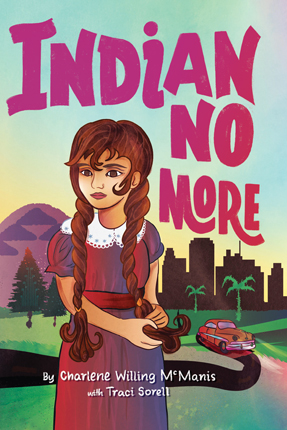| Indian no more Author: McManis, Charlene Willing | ||
| Price: $23.76 | ||
Summary:
When Regina's Umpqua tribe is legally terminated and her family must relocate from Oregon to Los Angeles, she goes on a quest to understand her identity as an Indian despite being so far from home.
| Added Entry - Personal Name: | Sorell, Traci |
| Accelerated Reader Information: Interest Level: MG Reading Level: 4.40 Points: 4.0 Quiz: 505844 | Reading Counts Information: Interest Level: 3-5 Reading Level: 4.40 Points: 7.0 Quiz: 77602 | |
Reviews:
Kirkus Reviews (08/01/19)
School Library Journal (+) (00/09/19)
Booklist (+) (00/02/25)
The Hornbook (00/11/19)
Full Text Reviews:
School Library Journal - 09/01/2019 Gr 4–7—Regina Petit and her family are Umpqua, living on the Grand Ronde Tribe's reservation in Oregon, until the U.S. government enacts a law saying that her tribe no longer exists. Ten-year-old Regina can't comprehend what is happening to her family and how they can have their Indian heritage taken away from them. Forced to move with her parents, grandmother, and younger sister, PeeWee, to Los Angeles, Regina finds her world turned upside down. Daddy believes that the 1957 Indian Relocation Program will provide their family with a home, schooling, a good job, and opportunities, while Chich (Grandma) is more doubtful, calling their relocation an eviction. Mama tries to keep her chin up for her family, but she just wants to go back home. Regina and PeeWee try to acclimate to their new neighborhood and school but find ignorance and racism toward Indians prevalent. New friends Keith and Addie are a bright spot for the Petit children, but as black children, Keith and Addie also face racism. Daddy tries to put on a brave face for his family, working hard to get ahead, only to discover that education and hard work aren't necessarily enough. The family's struggles are not sugarcoated; readers see the reality of Daddy's despair and anger as Mama tries to hold the family together. In the midst of it all, Chich carries forward their tribal stories. In this book based on McManis's own childhood experiences, the family is fictionalized to show how older children might react to being uprooted and plopped down in a foreign world—McManis was one year old when the government declassified her family's tribe. McManis died before finishing the novel, entrusting Sorell to finish her story. A lengthy author's note from McManis offers relevant history with which readers may be unfamiliar, along with family photos from this time. Also discussed in the note is the relevance of President Ronald Reagan changing the laws in 1983, enabling the restoration of tribes that had been terminated. VERDICT Readers will be moved as they become invested in Regina's predicament. Is she still Indian, American, or both—and what does that mean for her and her family?—Michele Shaw, Quail Run Elementary School, San Ramon, CA - Copyright 2019 Publishers Weekly, Library Journal and/or School Library Journal used with permission.
Booklist - 01/01/2020 *Starred Review* Regina Petit knew she was Indian because she had a tribal roll number—3669. But in 1954 when the Umpqua, along with other tribes along Oregon’s Grand Ronde had their tribal status terminated by the federal government, she was left with an empty sense of who exactly she was. With jacked up prices forcing them off their tribal land and no more government protections, the Petit family took up the Indian Relocation Program’s offer of opportunity and new beginnings. What begins as a story of displacement quickly turns into a story of childhood fun and antics colored by Umpqua culture and the racial tensions of the civil rights movement set in the lively and culturally diverse city of L.A. Regina’s character is thoughtful and hesitant as her father encourages their family to embrace their “Americanness,” while her younger sister, PeeWee, dives head first into their new community. While Regina struggles to make sense of her Indianness in L.A. throughout the book, her grandmother, Chich, grounds her in Umpqua folklore and history, helping her to understand the strength and resilience of her people and that that strength cannot be dictated by land. Included are a glossary of Chinuk Wawa terms, and notes from the co-authors, as well as images of the Grand Ronde Tribal Land and of the author’s childhood. - Copyright 2020 Booklist.



